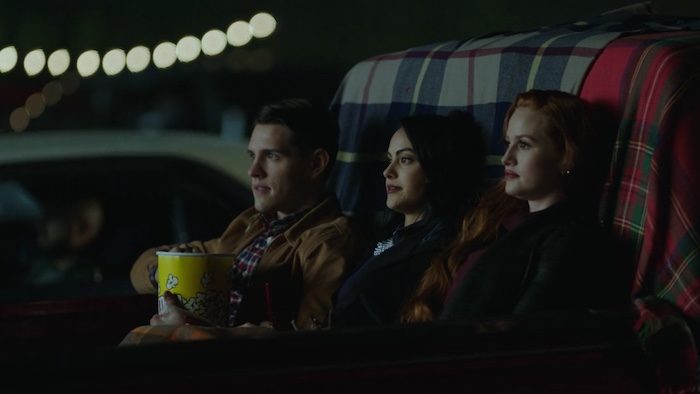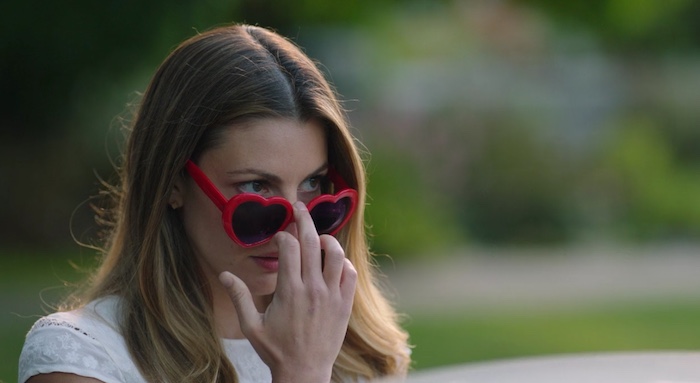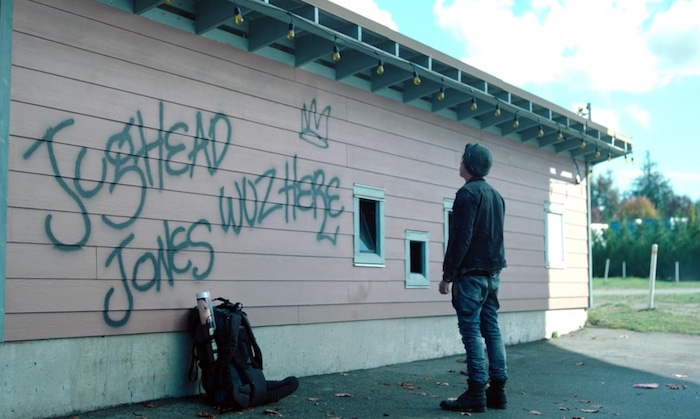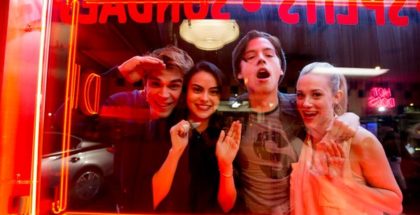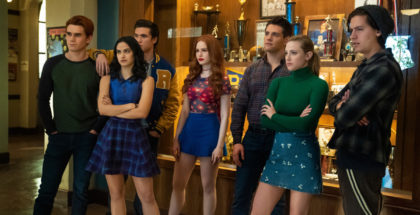Netflix UK TV review: Riverdale Season 1, Episode 4 (The Last Picture Show)
Review Overview
The Real Ms. Grundy
6The Last Picture Show
8David Farnor | On 19, Feb 2017
Warning: This contains spoilers for Episode 4. Not seen Riverdale? Catch up with spoiler-free review of the first three episodes.
“You might be a stock character from a 90s teen movie, but I’m not.” Honestly, four episodes into Riverdale and we could pretty much spend the entire time just writing down Veronica Lodge quotes. Endlessly popping culture references into conversations, while managing to be both sassy and sympathetic, Camila Mendes is everything that’s right with The CW’s take on Archie Comics.
Even the other characters seem to know it. “What was it like before she got here?” asks Kevin (Casey Cott), who gets a welcome chunk of screen-time in Episode 4. The answer, perhaps, is very dull, if Archie is anything to go by. KJ Apa’s redhead protagonist remains the weakest part of the show, partly because his music is only memorable when it’s played by Josie and the Pussycats, partly because there seems little depth to him more than his gorgeous abs and hair, and partly because he’s been busy making heart-shaped eyes at Ms. Grundy (Sarah Habel).
Their steamy encounter in Episode 1 has been one of the most disturbing parts of Riverdale, not least because of the way it was presented in a sub-Titanic, titillating fashion. Initially tying it into the gunshot they heard at the lake helped to make it seem more relevant, but Episode 4 is a reassuring step in the right direction for the show, as it calls out their affair for what it is: predatory abuse.
That’s because writer Michael Grassi thankfully wastes no more time in bringing that secret out into the public eye, with “friendly neighbourhood Hitchcock blonde” Betty (Lil Reinhart) confronting Archie at the diner, when she spots him and his dad having dinner with Ms. Grundy – and Veronica, naturally, overhears the whole thing. Betty promptly goes into ultra-defensive mode and grills Ms. Grundy, under pretence of doing a newspaper piece about her. Then, joined by Veronica, she breaks into her car, and realises that Ms. Grundy isn’t Ms. Grundy at all: she’s Jennifer Gibson. The real Ms. Grundy died years ago – a consolation for fans of the comics, in which the original Ms. Grundy was, erm, very much not like this Ms. Grundy – while the new Ms. Grundy has a gun in her car. In case we hadn’t decided already that she was a wrong ‘un.
Meanwhile, Alice Cooper (her name still makes us giggle) reads Betty’s diary (because of course she does) and immediately rounds up Archie’s dad and heads to Ms. Grundy’s to threaten her with legal proceedings. Grundy ends up agreeing to leave town instead. It’s a swift resolution for a troubling storyline, and, while it’s a shame that Alice’s motivation is more about bringing down Archie than exposing a predatory teacher, the show carefully frames everything to make it clear that Grundy is the villain – from Archie’s clueless sticking up for her (“You don’t know what we have… She believed in me when no one else did…”) to her exit at the end of the episode, which includes ogling more young men with her heart-shaped sunglasses.
We’ve probably not seen the last of her, but full credit to the writers for shipping her out of the picture before her subplot became both inappropriate and boring – and, with Archie in tears over the whole thing, here’s hoping he’s learned an important lesson that could develop his character.
It’s easy to forget that these are all people who are still developing; Riverdale, for all its neo-noir, Twin Peaks stylings, is still a coming-of-age story. And Episode 4 does a neat job of balancing coming-of-age moments for all of its central characters – something that’s more impressive given the amount of screen-time devoted to getting rid of Grundy.
Betty, who gets to show off her carjacking skills (which she picked up “from the Nancy Drew Detective Handbook” – the dialogue is Mean Girls good this episode), grows in her understanding of both herself and her mother, as she reconciles her own drive to protect Archie with her mother’s drive to protect her. (“Maybe some of what I did was wrong, but maybe I was right about some things too,” she writes in her diary. “Maybe Ms. Grundy was dangerous in some way. Tomorrow morning, when we wake up, the world will, yet again, be changed.”)
Veronica, meanwhile, learns some ugly home truths about her mum, which begin when Cheryl snaps a photo of Hermione Lodge and a member of the Southside Serpents gang meeting outsider the diner. “Cheryl, I went to school with your mother,” retorts Hermione, when Cheryl tries to insult her. “She didn’t know the difference between having money and having class either.” Marisol Nichols’ mum is as catty as her daughter, but far less honest – Veronica may be trying to turn a new leaf, sticking by her dad, but she discovers that her father’s corrupt reputation really is deserved, as her mum secretly pays off the Serpents for their work in helping to secure the land the drive-in is based on for Hiram Lodge. All is fair in cinemas and land development, apparently.
The Twilight drive-in, it turns out, is the real centre of the whole episode (note the title), as the town gather at the cinema for one final screening before it’s closed down for good. That means we get a chance to see Kevin buy all the food out of sheer sexual frustration – before falling into a fierce battle of tongues with a Southsider. Putting that in the same episode as his dad getting all his Jason Blossom evidence stolen makes it clear that the “wrong side of the tracks” love interest will only be bad news. After all, Kevin’s dad is already endearingly supportive of his son – “Is there not a nice gay kid at your school?” “Yeah. Me.” – so something’s got to spark some dramatic tension.
The Twilight, though, is more than just a hangout for the townies – even if that hangout does give us a nice glimpse of Cheryl putting aside her feud with Veronica and seeming to want to be friends. In a show stuffed with pop culture nods and overly adult speech (“Please, God, no more Quentin Tarantino references…”), the drive-in is a wonderfully knowing symbol for the stylised nostalgia that makes Riverdale so fun to watch; the whole programme is in thrall to old movies and cheesy dialogue. But if you’re tired of cynical teens being too witty for their own good, this episode has a superb sting in its tale, as Jughead, who protests about the Twilight’s closure, is revealed to have deeper ties to the drive-in than anyone else: it’s his “home away from home”, in that he actually lives there. He works there, sure, and loves the escapism, but underneath all that glossy surface, he’s just a boy worried about where he’s going to sleep. He’s not a stock character from a 90s teen movie either.
Riverdale is available on Netflix UK, as part of £7.49 monthly subscription, with new episodes arriving every Friday.


